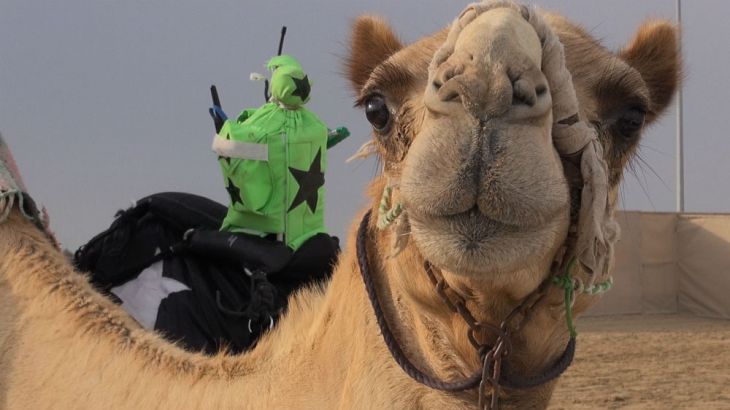Weary camels sent back to Qatar amid GCC rift
Among the victims of GCC crisis are hundreds of Qatari-owned racing camels, shipped back from UAE via Oman’s seaport.

Al-Ruwais, Qatar – After more than 20 hours at sea, some 200 tall and gangly passengers are anxiously getting off a ship at Qatar’s northern tip.
Led ashore in the middle of the night, they kick and pull their ropes.
Keep reading
list of 4 itemsQatar emir condemns ‘genocide’ in Gaza, urges ceasefire at GCC summit
‘Enduring commitment’: Key takeaways from US-GCC joint statement
Analysis: Efforts to end Assad isolation gather speed after quake
They are racing camels that got caught up in a diplomatic crisis after Saudi Arabia, the UAE, Bahrain and Egypt imposed a blockade on Qatar three months ago.
Caretakers with sticks impatiently usher them onto trucks to take them to stables near the Shahaniya race track, where the racing season has just begun. Soon they will be running for thousands of dollars of prize money with robots on their backs.
In total, 600 camels owned by Qataris and kept in the UAE have been brought back at the expense of the Qatari government.
They were banned from competing in the UAE after the four Arab countries cut ties with Qatar in a dispute over foreign policy.
![Qatar, Kuwait and the UAE alternate as hosts for racing tournaments [Cajsa Wikstrom/Al Jazeera]](/wp-content/uploads/2017/09/0f7b3d44b7fd42c99edd64d690bd4866_18.jpeg)
Neutral territory
The quartet expelled Qatari citizens and barred them from visiting, accusing Doha of supporting “terrorist groups”.
With borders closed and Saudi territory off limits to Qataris, transporting the camels from the UAE by land was not an option.
So they were brought to Oman, which has stayed neutral in the crisis, and then put on ships.
Kuwait, the UAE and Qatar alternate as hosts of the Arab Gulf region’s camel-racing tournaments, and the four-legged participants are normally transported by trucks between the countries.
This season, the sea will also be the only route open for Qataris bringing their camels to compete in Kuwait.
OPINION: GCC crisis – Why is Kuwaiti mediation not working?
The Qatari racing committee says no retaliatory measures will be taken against the UAE, with competitions in Qatar open to Emiratis should they wish to join.
Sultan bin Saad al-Muraikhi, Qatar’s minister of state for foreign affairs, alluded to the fate of Qatari camels in his speech at an Arab League summit in Cairo earlier this month, lashing out at the boycotting quartet.
“Even the animals were not spared, you sent them out savagely,” Muraikhi said, referring to thousands of livestock caught up in the crisis as Saudi Arabia closed its border with Qatar in June.
![Thousands of camels were brought back to Qatar when Saudi Arabia closed the border [Cajsa Wikstrom/Al Jazeera]](/wp-content/uploads/2017/09/9b393ea7bcc94ba58e8c607a17d204e3_18.jpeg)
Sweltering summer heat
Camel owner Mohammed Abu Salem al-Marri told Al Jazeera that his animals had to walk in the sweltering summer heat for six days from deep inside the Saudi desert to reach the Qatar border.
When his camels, together with thousands of other ones, arrived at the collection point, Marri said, they were dehydrated and exhausted and still had to wait for three days for the opening of the border.
When that finally happened, crowds of camels pushed through, some tripping on each other and getting crushed.
“It was hot, and there were a lot of camels. They were all trying to cross at once,” Marri said. “We lost a baby camel. Others lost more. I saw many dead camels.”

Hundreds of camels are reported to have perished in the border stampede and as a result of the hardships arising from their rushed return.
The reason many Qataris kept their camels in Saudi Arabia is that in the vast deserts there, they could roam around freely. In Qatar, which is tiny in comparison, they have to be kept fenced in. The government has banned herding to protect trees and plants.
Marri now keeps his camels, some 70 of them, in pens in the rocky desert near the border.
He hopes that the Qatari government will change regulations and establish a zone where herding of camels will be allowed.
“Just like humans, camels need to move,” he said. “They can’t live fenced in.”